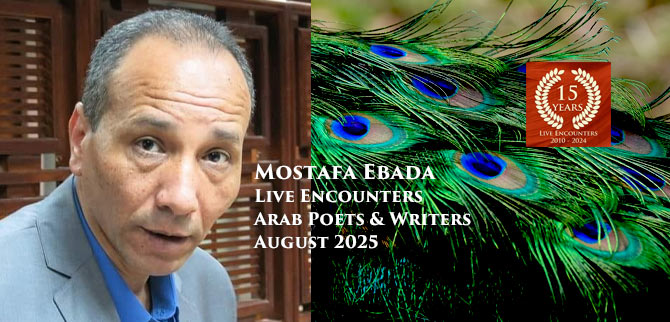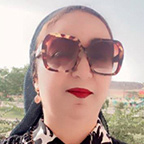
Live Encounters Poetry & Writing August 2025
Gazing at the Navel, poems by Mostafa Ebada.
Translated from Arabic by Dr. Salwa Gouda.
Gazing at the Navel
1
In houses of mud and flies
Millions are now raised like us
And they will become us.
Everything for them is a crime,
Or, at best,
Chronic fear:
Woman, God, and travel.
They will think every road
A trap,
Or a snake.
That their mothers’ feet
Are the end of the world.
And when light floods them,
They raise their palms in prayer:
“Our Lord, do not hold us accountable for what the fools among us have done”
Instead of gazing at the navel.
2
The matter is very simple:
One of them trusted life too much,
And with that same simplicity,
It stabbed him.
And when he resigned his fate to destiny—compelled—
It betrayed him.
So he had to end his war
With that wretchedness himself.
He made a vow:
Not to be vulgar, however great the temptations,
And to sanctify everything:
To gaze long at the breast, the belly,
The ankles, and the factory of secrets—
For those are their dwellings,
Occupied but briefly.
3
I was not with her.
I did not hold her hands,
Or whisper things she loves:
A memory,
Or a dewy evening.
I was here, hustling in markets,
Avoiding death with every step,
Every moment, every day, every year.
And I know she forgives me.
She who saw me tame
Camels, like any seasoned chief.
She who woke me in winters
That killed,
And pulled thorns from my feet,
And blew dust from my eyes,
And said: “Do not forget—
Forgetting is a betrayal of pain.”
And when food is laid
On Thursday / Market day,
She spreads her soul,
Leaving room for the Creator’s hands.
4
Every night before leaving,
I gather a basket of laughter and dreams,
Books and my female friends,
And their traces on my skin.
I place them in the office drawer.
I file every feeling in a compartment:
This compartment holds my repeated betrayals
Of you—
Which I deeply enjoyed committing,
Spitting in regret’s face
Every time.
This compartment hides
My history and memories of streets
I walked deprived and alone.
And this one holds the mirrors
I prepare for our next meeting:
How to laugh,
How to appear calm,
How to play the madman,
And call my sorcerer friends:
“Take her hand to the river,
Make her revive the old laughter
And the old sorrow.”
5
The whole story
Is that someone
Decided to make his life a text,
And his days an inkwell.
Then suddenly, his heart flooded:
“Beautiful men are more than can be counted,
And you are not one of them.
You do not blow kisses into the air;
If they wink, they are exposed,
And the wink turns into deliberate offense.”
6
Long ago,
I drew my maps:
Your cave is the destination,
And sin is but joy
Inherited from Adam.
I will leave all sorrow
To those devoured by hatred
And piety—
Who wake before everyone,
Repeat the same errands,
Secrets, and sensual metaphors,
Who hate the night.
I grudge them elegies,
For our surplus ink
Maps desire.
This is my lap, which the jinn maidens
Filled with forbidden fruit every morning.
So night never comes
But I am suspended
On the tree of eternity.
7
The man who, night after night,
Trains his hands in play
On the importance of touch,
And separating bones from desire
And whose demons come obedient,
He learned alone the laws of lament.
He missed the maps of imagination
As you climbed the tree… so he saw,
And stitched for himself from leaves
What veiled the whole world from his eyes,
Igniting it in his core.
He saw your forest, killed by loneliness,
Resurrected by the tree,
And it lives now
In this poem,
Which I sent to you,
And you did not reply.
And when you said, “Show me
How Adam was defeated,”
I showed you.
When you said, “Enough,”
I did not believe—I could not believe.
I gaze from that day onward
At the making of the world,
At the parting of water from land,
At maps that belong to me.
And whenever I tried to tell you
Of my failure,
Your forest screamed and sprouted me.
The hawks of the earth bit my neck
I am the hasty map-reader:
Here lie the fats and the maps,
Here the fruit and the plateaus,
Mountain ranges,
Here humanity and harm,
The taut armpit,
And the birthplace of grief.
Why did you place me in this paradise?
Why did you make me alone?
© Mostafa Abada
Mostafa Ebada (born 1965) is an acclaimed Egyptian journalist, poet, essayist, and literary critic. He currently serves as the Deputy Editor-in-Chief of Al-Ahram Al Arabi Magazine and holds the position of cultural advisor for several prominent Egyptian publishing houses, including The Egyptian Lebanese House, Al-Mahrousa Center, and Dar Batana. With a prolific career spanning multiple creative fields, Ebada has authored over 10 books encompassing poetry collections, cultural studies, and literary critiques, solidifying his reputation as a versatile and influential figure in contemporary Arabic literature.
 Translated by Dr. Salwa Gouda, who is an accomplished Egyptian literary translator, critic, and academic affiliated with the English Language and Literature Department at Ain Shams University. Holding a PhD in English literature and criticism, Dr. Gouda pursued her education at both Ain Shams University and California State University, San Bernardino.
Translated by Dr. Salwa Gouda, who is an accomplished Egyptian literary translator, critic, and academic affiliated with the English Language and Literature Department at Ain Shams University. Holding a PhD in English literature and criticism, Dr. Gouda pursued her education at both Ain Shams University and California State University, San Bernardino.
She has authored several academic works, including Lectures in English Poetry and Introduction to Modern Literary Criticism, among others. Dr. Gouda also played a significant role in translating The Arab Encyclopedia for Pioneers, a comprehensive project featuring poets, philosophers, historians, and literary figures, conducted under the auspices of UNESCO. Recently, her poetry translations have been featured in a poetry anthology published by Alien Buddha Press in Arizona, USA. Her work has also appeared in numerous international literary magazines, further solidifying her contributions to the field of literary translation and criticism.

